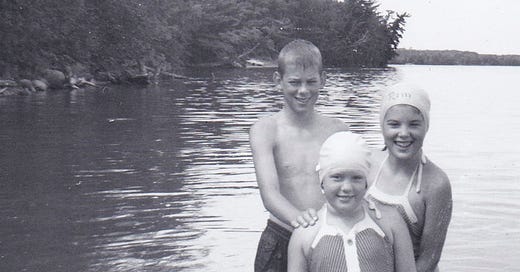This Substack entry is part of a series describing childhood time spent with my family in Northern Wisconsin. I learned many important life lessons during those two week time periods, not the least of which was the meaning of life and death.
One thing Mom loved to do up North was to take us out fishing. (Our father had a condition where he would faint at the sight of blood, so had no interest in this activity.) We would dig up some juicy night crawlers, load up our boat, put on our life vests, row out to what we called “The Drop-off” and put down anchor. There was a floating marker for where it was, and we spent many an early evening out there reeling in perch, pike and smallmouth bass. One amazing night when the fish were “biting”, we brought back seventy-six fish. Mom was in fishing heaven, and couldn’t wait to tell Dad and the entire resort about our catch.
She was fearless about every aspect of fishing: worming the hooks, unhooking the flapping fish, untangling lines, adjusting bobbers, reaching out over the water with the net for the big ones, calling out instructions on how to reel them in. It seemed as if she had gotten a degree in fishing, something we all took for granted back then. She was also undaunted about cleaning, boning and scaling them, frying them in a delicious batter in her beloved electric frying pan.
Grindstone Lake, as with many lakes Up North, was home to a large fish called the muskellunge, or “Muskie” for short, from the Ojibwa word for it, meaning “ugly Pike”. It is the largest and most assertive and voracious member of the pike family, and considered a sport trophy fish in Northern Wisconsin. They could grow to forty pounds or more, and could also put up a good fight when hooked. After being caught, they were stuffed and preserved for bragging rights; they weren’t good eating. It wasn’t unusual to walk into a bar in Northern Wisconsin and see a Muskie overhead on a plaque, usually accompanied by a photo of the fisherman responsible for the catch.
When hunting Muskie, one could not troll them in a motor boat. Rowing was the only legal way to catch them. Anything else was considered bad sportsmanship, aside from being unlawful. A fishing license was also required by the state, and we bought one each year for our forays out on Grindstone Lake, and nearby Lac Courte Oreilles.
As I grew older and became more sentient, by my late teens I couldn’t stand to see fish gasping for air in the bottom of a boat, so I put down my fishing pole. They looked so lovely in the water, silvery and happy. I still ate fish, but that didn’t mean I had to watch them die.
Another memorable food from our vacations was fresh sweet corn. Mom had found out about a woman who sold corn at her farm, so we would drive there a couple of times each year to buy several ears. I was usually fascinated and at the same time, terrified to go on this trip, because the woman had an adult son who was severely retarded. We would pull up in our car and he would be nearby playing with a dish of water, drooling and making groaning noises that, to me, sounded like he was being tortured.
I think Mom thought we should be exposed to this kind of handicap, so she was always reassuring us that the man couldn’t and wouldn’t harm us, but that didn’t assuage my deep fear. But, the corn was always amazingly good, especially that fresh, and with lots of melted butter.
Pamela Bayard Foard is the author of the children’s book, “Giselle and the Little Idea”. If you liked this post, please show the love by clicking the little heart, or better yet, leave a comment! I would love to hear from you.





Yay, more background I had not heard until now. Thanks!